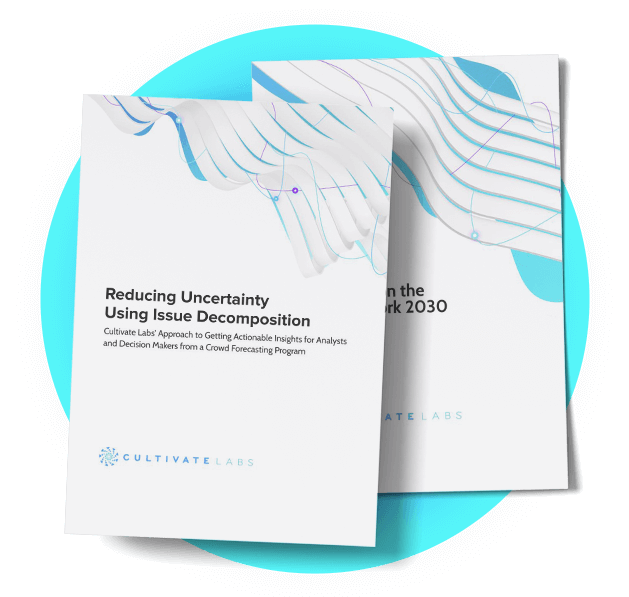Cultivate Labs Blog
Discussing how crowd forecasting, internal crowdfunding, and other new workplace trends can be used to improve the #futureofwork

Sign Up For Our Monthly Newsletter
By Jess Price on Oct 06, 2015
VC's should be doing this
Amongst the leadership teams of the portfolio companies at any medium to large investment firm, there is an incredible amount of experience, wisdom, and perspective that is not collectively being taken advantage of.
Read moreBy Ben Golden on Oct 05, 2015
Your Competitors Are Predictable
We recently started working with a Houston-based client in the Energy sector, who wanted to use a prediction market to help with internal operations, and to create greater transparency and communication within their company. We spent a couple months meeting with our client to learn about their business and objectives, and using test questions (e.g. asking about Houston sports teams) to help participants understand how prediction markets work. Our initial questions focused on specific operations
Read moreBy Vanessa Pineda on Oct 05, 2015
There's No Driving With a Dead Engine: The Importance of Project Sponsorship
Have you ever been tasked with driving a project you’ve felt was going nowhere? Maybe you were a project manager or project owner, coordinating a team that was working on something you felt wasn’t gaining traction within the organization.
Read moreBy Ben Golden on Oct 02, 2015
Prediction Market Failure
Effective prediction markets require a certain amount of liquidity--meaning that after users invest points in making a forecast, and while the question is still running, they need a way to exit their investment.
Read moreBy Cultivate Labs on Oct 01, 2015
Superforecasting -- Everything has a base rate
Basically, we want to find the base rate of similar events occurring, and then adjusting that percentage by taking into account the differences between this event and the similar ones.
Read moreBy Ben Golden on Sep 28, 2015
Does TruthCoin Solve A Problem?
I've been following the development of TruthCoin, a platform for decentralized prediction markets, for a while now. Prediction markets at their core are about crowdsourcing forecasts. At Cultivate Labs, we've also built a platform to crowdsource question authorship. TruthCoin goes one step further and crowdsources question resolution.
Read moreBy Ben Golden on Sep 21, 2015
Forecasting Atrocities
Holly Ramer has a piece up at the Washington Post about our work with the United States Holocaust Memorial Museum to identify risks of mass violence in different countries:
Read moreBy Adam Siegel on Sep 17, 2015
Nation of Insecurity
In society’s harsh klieg light, if you’re not a world class athlete with multiple Super Bowl rings, your company isn’t worth a billion dollars, you don't have rock hard abs 3 months after having a baby, or you’re a politician polling in single digits, you’re “middling.” 20 years ago, it was unheard of to meet anyone who had run a marathon, and rarer still to meet anyone who had completed an Ironman. Now you’re lucky to get a “nice job” on Facebook.
Read moreBy Ben Golden on Sep 14, 2015
Evaluating Accuracy Effect By Percentile
In my last post analyzing my own forecasting history on Inkling Markets, I showed that I was consistently identifying long-shot bets that were more likely to pay off than their existing probability would suggest. In this post, I'll look at how my forecasts improve the accuracy of these markets, calculating how many the change in component Brier score within different percentiles.
Read moreBy Ben Golden on Sep 11, 2015
Evaluating User Forecasts By Percentile
To analyze forecasts' accuracy, I looked specifically at forecasts that crossed percentile thresholds, and then examined how often the result being forecast actually occurred.
Read moreBy Ben Golden on Sep 09, 2015
Usually Wrong Can Be Right
We're developing some new tools to analyze forecasters' performance, biases, and ways to help them improve, and I've been digging into my own forecasting history on Inkling. I've focused on a set of 3,343 forecasts I've made in questions that use an LMSR algorithm and have already resolved. The first interesting finding is that most of my forecasts have been wrong.
Read moreBy Ben Golden on Aug 31, 2015
What Ashley Madison Can Teach About Prediction Markets
(You know, besides how to cheat...)The recent hack of Ashley Madison--a dating service marketed towards married people--revealed that almost no women were actively using the site. Rather, the site's almost entirely male userbase was paying to interact with non-existent, fake, or inactive female accounts.
Read moreBy Ben Golden on Aug 20, 2015
Gaming Prediction Markets
Prediction markets are generally very good at generating accurate forecasts, but a key secondary challenge is to determine which forecasters are contributing most to forecast accuracy. User scores are closely linked to their accuracy because the underlying market mechanism rewards users when they move a forecast closer to its actual result and penalizes them when they move the forecast away from the result.
Read moreBy Adam Siegel on Aug 20, 2015
An Unintended Consequence of Profit Sharing
When Ben and I started Cultivate and talked about the core tenets we wanted the company to follow, one was to have people we worked with share in the profit the company was generating outside of any normal compensation. But that may be having some unintended consequences.
Read moreBy Ben Roesch on Aug 16, 2015
Crowdsourced Forecasting & Why it's the Best Forecasting Tool Around
What is Crowdsourced Forecasting and Why is it the Best Forecasting Tool Around? Francis Galton was an English scientist who believed in the stupidity of the average human. Galton believed that, to have a healthy society, you needed to concentrate power in the select few who didn't fit that bill.
Read moreBy Vanessa Pineda on Aug 16, 2015
The Simple Answer to Change Management
“How do we get people to do things?” It was only the first week at my new job here at Cultivate Labs when a client asked about how to increase participation in their prediction market. It’s the million-dollar question that undoubtedly comes up in every work project that requires any sort of change management effort... ever.
Read moreBy Ben Golden on Aug 06, 2015
Someone Has To Win
On December 7 of last year, the Carolina Panthers were 3-8-1 and I spent about 1100 Inkles forecasting that they would make the playoffs. Even at long odds, this may seem like wasted Inkles--I'm pretty sure that a 3-8-1 had never gone on to make the playoffs. But there were a couple other important factors.
Read moreBy Ben Golden on Jul 23, 2015
Pundits and Prediction Markets
As I've become more involved with prediction markets, I've grown increasingly frustrated with journalists who make predictions (aka pundits) without linking to prediction market questions. This is, in my opinion, lousy journalism, and insulting to readers.
Read moreBy Ben Golden on Jul 23, 2015
When Intuition 'Trumps' Analysis
In growing my Inkling score from five thousand to ten million Inkles, one of the most important questions was related to the number of points each team would score in the most recent NBA season. The question asked about the difference between each team's points and the average of all teams.
Read moreBy Ben Golden on Jul 17, 2015
Enterprise Crowdsourcing: A Primer
When my grandmother immigrated to the United States, she couldn't afford to call her family on the telephone. That was about 70 years ago. Today, I have a friend whose brother moved to Sri Lanka to become a Buddhist monk and literally lives in a cave. He and his family Skype. This is the power of the Internet--for a significant portion of the planet, it's now possible for any two people to communicate from anywhere, in real-time, basically for free.
Read moreBy Ben Golden on Jul 16, 2015
The Best Is Not Enough
Barry Ritholtz has written a curious column titled The 'Wisdom of Crowds' Is Not That Wise for Bloomberg View, which criticizes prediction markets. This is not a new view for Ritholtz, as he reminds us by linking to six blog posts critical of prediction markets each written by...Barry Ritholtz. Indeed Ritholtz has made it his mission to find instances of prediction markets 'failing', and has found six of them.
Read moreBy Ben Golden on Jul 02, 2015
I, Benthinkin
The challenge was daunting—Inkling users start with five thousand Inkles--while the top forecasters have accrued hundreds of millions (in one case billions).
Read more


















